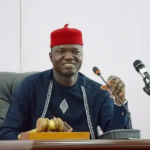By Agbeze Ireke Kalu Onuma, AI-KO
I tried this on a school friend recently: “Do you remember Onuora Nzekwu?”
A puzzled frown. “Was he in our class?” he asked.
I smiled, a little smirk, really. “Oh no,” I said. “He wasn’t a classmate.”
“Then who is he?”
“Think back,” I nudged. “Do you remember Eze Goes to School?”
Recognition dawned on his face. “The book we read in Class 1? Of course! What about it?”
“Everything,” I said, my voice dropping. “That book was everything.”
“What do you mean, ‘everything’?”
There was a pause, and then he threw his hands up. “My friend, I don’t even remember what happened in that book, and you want me to remember who wrote it?”
That exchange is us in a nutshell. It’s so typical of those of us who held that book in our hands, only to let its creator fade from memory.
And that is why I must now turn my gaze to Onuora Nzekwu. He was the quiet giant who shaped the very soul of a generation emerging from the shadows of war and loss. His prose wasn’t flamboyant – it was foundational. He didn’t just tell us stories for fun; he educated us, he preserved a piece of us, and in doing so, he gave us dignity.
INTRODUCTION
There are writers whose names are etched into the national consciousness not because they courted fame, but because they cultivated meaning. Onuora Nzekwu was one such writer – a quiet architect of post-war Nigerian literature, whose words shaped the moral imagination of a generation. For many of us who grew up in the aftermath of the conflict, his stories were not just books – they were blueprints. They taught us how to walk with dignity, how to speak with integrity, and how to dream beyond scarcity.
Born in 1928 in Kafanchan, Northern Nigeria, but rooted in the cultural soil of Onitsha, Nzekwu’s life was a bridge between regions, between traditions, and between epochs. He began his career as a civil servant, later becoming the editor of Nigeria Magazine, a publication that documented the country’s cultural and artistic life with rare depth and elegance. He would go on to serve as the General Manager of the News Agency of Nigeria (NAN), but it was his literary work that left the most indelible mark.
His debut novel, Wand of Noble Wood (1961), published in the prestigious African Writers Series, was a serious and layered exploration of Igbo customs, marriage rites, and the tension between tradition and modernity. It was not written for applause – it was written for posterity. In it, Nzekwu wrestled with the complexities of cultural inheritance, asking difficult questions about autonomy, obligation, and the cost of conformity. It was a novel that didn’t just describe Igbo life – it dignified it.
But it was Eze Goes to School (1963), co-authored with historian Michael Crowder, that made Nzekwu a household name. The story of young Eze Adi, who braved poverty and prejudice to pursue education, became a rite of passage for Nigerian children. It was more than a children’s book – it was a moral compass. It taught us that ambition could survive barefoot walks, that character could outshine circumstance, and that education was not just a privilege – it was a pilgrimage. The sequel, Eze Goes to College (1988), continued this journey, chronicling Eze’s trials in higher education with the same clarity and conviction.
Later in life, Nzekwu turned his pen toward cultural preservation. Faith of Our Fathers (2003) is a masterwork of ethnographic devotion – a compendium of Onitsha’s beliefs, institutions, and values. It is not fiction – it is foundation. It reads like scripture, like a sacred archive of a people’s soul. His earlier work, The Chima Dynasty in Onitsha (1977), similarly blends oral history and archival research to trace the lineage of monarchs, offering a rare glimpse into the political and spiritual architecture of Igbo kingship.
What makes Nzekwu’s work enduring is not just its literary merit – it is its moral clarity. He wrote in a time of national uncertainty, when Nigeria was still stitching itself together after the trauma of war. His stories offered not escape, but instruction. They were not flamboyant – they were foundational. They taught us how to live with honor, how to navigate tradition without being trapped by it, and how to pursue excellence without losing empathy.
But here’s the truth: Onuora Nzekwu’s works are vanishing from our shelves, our syllabi, and our collective memory. His name is still whispered in literary circles, but his books – especially the historical ones – are increasingly hard to find. Faith of Our Fathers, The Chima Dynasty in Onitsha, even Wand of Noble Wood – these are not just texts. They are testimonies. They are not just records. They are repositories of wisdom, worldview, and cultural architecture.
These books do more than inform – they initiate. They draw us into the rituals, rhythms, and reasoning of a people who understood justice, hierarchy, spirituality, and community in ways that modernity often forgets. Nzekwu didn’t just document Onitsha traditions – he dignified them. He didn’t just describe kingship – he decoded it. His historical works are not academic footnotes; they are living archives. And we are losing them.
So this is a challenge – not just to scholars, but to publishers, educators, cultural custodians, and creatives. Bring these works back. Reprint them. Digitize them. Teach them. Adapt them. Let Faith of Our Fathers be read in classrooms. Let The Chima Dynasty be studied in civic education. Let Wand of Noble Wood be staged in theatres. Let Eze Goes to School be animated for children who no longer read.
His voice still speaks. It speaks through the pages of Eze Goes to School, still read in classrooms. It speaks through the rituals described in Faith of Our Fathers, still practiced in Onitsha. It speaks through the quiet dignity of his prose, still relevant in a world that often forgets the value of restraint.
This reflection is not just literary – it is devotional. It is a pilgrimage through the wisdom of a man who wrote not to impress, but to instruct. These 40 quotes are drawn from his major works, each followed by a meditation – my own wrestling, my own reckoning. Because Onuora Nzekwu doesn’t just write about Nigeria – he writes about what it means to be human, to be honorable, and to be whole.
We owe it to Nzekwu. But more importantly, we owe it to ourselves. Because in recovering his works, we recover our roots. We recover our rhythm. We recover our responsibility to remember.
Let this reflection be more than a tribute. Let it be a turning. Let it be a torch.
Let us walk with him. Let us listen. Let us learn.
FROM EZE GOES TO SCHOOL
“EZE WALKED BAREFOOT TO SCHOOL, BUT HIS MIND RAN FASTER THAN SHOES EVER COULD.”
Poverty was no match for purpose. Nzekwu teaches us that the absence of comfort does not mean the absence of destiny.
Eze’s bare feet symbolize material lack, yet his quick mind represents an abundance that cannot be purchased. True wealth is not measured by possessions but by the velocity of one’s thoughts, the depth of one’s curiosity, and the strength of one’s will. In a world obsessed with appearances, this reminds me that intellect and vision remain the ultimate equalizers.
To walk barefoot is to feel the earth’s resistance – the stones, the heat, the dust. Yet Eze’s mind transcended those obstacles. His journey was not hindered by hardship; it was sharpened by it. I see in this the eternal truth that purpose often grows best in the soil of struggle. Comfort can dull ambition, but adversity refines it.
Each step Eze took toward school was a step toward freedom. His story reflects the timeless African belief that learning is a form of emancipation – a way of rewriting one’s destiny. Today, I am reminded that every act of learning, no matter how small, is a rebellion against limitation.
Each time I meditate on this image, I see my own path mirrored in Eze’s. There are days when I, too, walk barefoot – not literally, but through uncertainty, scarcity, or self-doubt. Yet, like Eze, I must let my mind run ahead, guided by purpose rather than comfort. The lesson is simple but profound: progress is not about what you have, but about what you carry within.
Let today be a reminder that the absence of comfort is not the absence of destiny. Struggle is not a sign of failure but a forge for greatness. When the road is rough, let the mind run faster – for even barefoot, purpose always finds its way.
“HIS FATHER DIED, AND THE VILLAGE SPENT ALL THE MONEY ON A BURIAL. BUT EZE STILL WANTED TO LEARN.”
Tradition can be beautiful – but it can also be costly. Nzekwu questions what we value, and what we sacrifice in the name of culture.
The burial, grand and consuming, mirrors a society that often equates honor with extravagance. In honoring the dead, the living are sometimes left impoverished. This moment in Eze’s story exposes the tension between reverence and reason – between cultural pride and practical survival. It challenges me to ask: At what point does tradition stop preserving identity and start draining potential?
Despite the loss, despite the emptied pockets, Eze’s hunger for learning remained undimmed. His persistence is not merely ambition – it is defiance. He teaches that purpose does not wait for perfect conditions; it grows in the cracks of scarcity. I see in this a mirror of the human spirit’s resilience – the refusal to let circumstance dictate destiny.
Nzekwu’s narrative forces a reckoning with how communities allocate value. The burial feast fed the village’s pride but starved its future. It’s a poignant metaphor for how societies sometimes invest in symbols rather than substance. Today, I am reminded that culture must evolve – not to discard its roots, but to ensure that its branches can still bear fruit.
In my own life, I often feel the pull between honoring where I come from and pursuing where I must go. There is dignity in tradition, but also danger when it becomes a chain. Eze’s story whispers to me that love for one’s heritage should never mean the death of one’s dreams. The truest way to honor the past is to ensure the future is not buried with it.
Let today be a meditation on balance – between respect and renewal, between memory and movement. Culture should empower, not impoverish. Eze’s choice to keep learning, even when all else was lost, is a call to every generation: do not spend the future burying the past.
“EZE WAS ACCUSED OF CHEATING, BUT HE STOOD FIRM. TRUTH WAS HIS ONLY DEFENSE.”
Integrity is not loud – it is lasting. Nzekwu reminds us that character is forged in fire.
Accusation is a fire that tests the metal of a person’s soul. When Eze stood before judgment, he had no wealth, no influence, and no allies – only the truth. His silence was not weakness but strength, the quiet confidence of one who knows that time will vindicate honesty. In a world quick to condemn, his composure becomes a lesson in moral endurance.
To stand firm when falsely accused is to stand alone. Eze’s experience reveals that integrity often isolates before it elevates. The crowd may doubt, the system may fail, but truth remains constant. I see in his resolve a reflection of the courage required to hold one’s ground when perception turns against conviction.
Nzekwu’s portrayal of Eze’s trial is not just about justice – it is about formation. Fire does not destroy gold; it refines it. Likewise, accusation and adversity reveal what cannot be faked: the substance of one’s character. Today, I am reminded that reputation is what others see, but integrity is what remains when no one believes you.
There are moments in my own journey when misunderstanding feels heavier than guilt, when being right offers no relief because others cannot see it. Yet Eze’s story teaches me that truth does not need applause to endure. The calm of integrity is its own reward. I must learn to let truth defend itself, even when my name is questioned.
Let today remind me that truth may walk slowly, but it never loses its way. Integrity is not proven in comfort but in conflict. Eze’s steadfastness calls me to live with such inner clarity that even when words fail, my actions speak for me. Character, once tested and true, becomes the quiet flame that outlasts every storm.
“MR. OKAFOR SAW SOMETHING IN EZE. HE GAVE HIM BOOKS, AND WITH THEM, A FUTURE.”
Mentorship is a sacred act. One person’s belief can rewrite another’s story.
Mr. Okafor’s gift was not just books – it was belief. He looked beyond Eze’s poverty and saw potential. That gaze of faith transformed a boy’s struggle into a story of ascent. True mentorship begins when someone sees in us what we cannot yet see in ourselves. A single act of generosity can alter generations. Mr. Okafor’s gesture reminds me that influence is not measured by grandeur but by impact. When we invest in others, we plant futures we may never live to see. In my own journey, I remember those who handed me “books” – not always literal, but symbolic: opportunities, encouragement, correction. Their faith became my foundation. Today, I must ask: Whose story am I rewriting through belief? Mentorship is ministry. To believe in another is to breathe life into destiny. Be someone’s Mr. Okafor.
“EZE’S MOTHER SOLD VEGETABLES TO PAY HIS FEES. HER HANDS WERE TIRED, BUT HER HOPE WAS STRONG.”
Behind every dream is a woman who labored in silence. Nzekwu gives her dignity.
Her hands, cracked from toil, were the unseen engines of Eze’s education. Nzekwu’s prose elevates her from background to backbone. She is the unsung architect of her son’s destiny. Each basket of vegetables was more than commerce – it was sacrifice. Her labor translated into learning, her fatigue into his future. That exchange defines the truest form of love: giving until it hurts, and still giving more. I see in her the reflection of every mother who traded comfort for her child’s chance. I carry their prayers in my progress. Their sacrifices are the invisible ink in every certificate, every success. Honor the hands that built your tomorrow. Gratitude is the only repayment worthy of their labor.
“THE SCHOOL BELL RANG, AND EZE RAN – NOT FROM FEAR, BUT TOWARD POSSIBILITY.”
Education is not just a system – it’s a sanctuary. Nzekwu makes it sacred.
The bell was not a summons to duty – it was an invitation to destiny. Eze’s run was a sprint toward transformation, a physical echo of intellectual hunger. In Nzekwu’s world, classrooms are temples where minds are reborn. Education is portrayed not as privilege but as pilgrimage – a holy pursuit of self-discovery. Each morning offers its own bell, calling me toward growth. The question is not whether I hear it, but whether I run. Do not walk toward your purpose – run. The future favors the swift of spirit.
“EZE FAILED A TEST, BUT HE DID NOT FAIL HIMSELF.”
Failure is not defeat – it is data. Nzekwu teaches us to learn, not to loathe.
Eze’s failure was not a verdict but a voice – a whisper that said, “Try again, but wiser.” In Nzekwu’s narrative, mistakes are not stains but stepping stones. Every failure teaches what success conceals. True education happens not in the passing, but in the persistence. I have learned that failure is not the opposite of success; it is its tutor. Each setback refines my method, not my worth. Fail forward. The only true failure is refusing to rise.
“HE READ BY MOONLIGHT, AND THE STARS SEEMED TO LISTEN.”
There is something holy about hunger for knowledge. Nzekwu paints it with reverence.
The image of Eze reading under moonlight is both literal and luminous – a boy illuminated by both the heavens and his own hope. Learning here becomes worship. The stars, silent witnesses, testify to his devotion. Knowledge is no longer mere pursuit – it is prayer. I recall nights when passion outlasted exhaustion, when curiosity kept me awake. Those moments, though quiet, built the loudest parts of my destiny. Study like the stars are watching. Greatness begins in the glow of small, faithful acts.
“EZE’S CLASSMATES MOCKED HIS TORN SHIRT, BUT HE WORE IT LIKE ARMOR.”
Shame cannot stick to a soul that knows its worth.
Eze’s torn shirt becomes a metaphor for dignity amidst deprivation. He transforms ridicule into resilience, turning pain into pride. The Invisibility of Inner Wealth
His confidence exposes the poverty of those who mocked him. True worth is internal, immune to external judgment. I, too, have worn “torn shirts” – moments of lack, of being underestimated. Yet those were the seasons that taught me to stand tall without validation. Wear your scars like medals. Confidence is the finest clothing.
“HE STOOD BEFORE THE HEADMASTER, TREMBLING – BUT HE SPOKE WITH TRUTH.”
Courage is not the absence of fear – it is the presence of conviction.
Eze’s trembling does not diminish his bravery – it defines it. Fear acknowledged yet overcome is the purest form of strength. In that moment, words became weapons of integrity. His honesty, though fragile, was unbreakable. There are times when my voice shakes, but I must speak anyway. Courage is not confidence – it is commitment to truth despite trembling. Let your fear tremble, but let your truth stand firm.
FROM EZE GOES TO COLLEGE
“COLLEGE WAS HARDER THAN EZE IMAGINED. BUT HE HAD NOT COME TO BE COMFORTABLE – HE HAD COME TO CONQUER.”
Growth is not gentle. Nzekwu shows us that ambition must be matched with endurance.
Eze’s struggle in college mirrors the reality that every elevation demands effort. Comfort and conquest rarely coexist. Growth stretches; it never soothes. Nzekwu’s portrayal of Eze reminds me that discomfort is the tuition of transformation. Every time I’ve chosen challenge over ease, I’ve expanded my capacity. True progress often begins where comfort ends. Endure the climb. The summit always justifies the strain.
“HE REFUSED TO JOIN THE CULT. HE CHOSE SOLITUDE OVER SAFETY.”
In a world of compromise, Eze chooses conscience. That is revolutionary.
Eze’s refusal is a rebellion against conformity. He chooses integrity over inclusion – a decision that costs him comfort but preserves his soul. Standing alone is never easy, but solitude with integrity is better than fellowship with corruption. There are moments when silence or complicity seems safer. But Eze’s example teaches me that peace bought with compromise is counterfeit. Better to stand alone in truth than be embraced by falsehood.
“EZE STUDIED BY CANDLELIGHT, WHILE OTHERS PARTIED. HIS LIGHT WAS DIM, BUT HIS VISION WAS CLEAR.”
Discipline is a quiet fire. Nzekwu honors the slow burn.
Eze’s candlelight symbolizes clarity amidst distraction. His dim flame outshines the noise of indulgence. Success seldom arrives in flashes – it glows, steadily, through discipline. The slow burn sustains what the quick spark cannot. I, too, must protect my small light from the winds of distraction. Every quiet hour invested compounds into brilliance. Keep your flame steady. Greatness is built in the shadows of consistency.
“HE FAILED ONCE. BUT HE DID NOT FALL.”
Resilience is not glamorous – but it is glorious.
Failure knocked, but Eze refused to stay down. His resilience is not loud – it’s lived. Falling is inevitable; staying down is optional. Each rise refines the rhythm of strength. Every failure I’ve faced has been a rehearsal for resilience. The fall hurts, but the rise heals. Fall if you must – but rise because you must.
“GRADUATION WAS NOT THE END. IT WAS THE BEGINNING OF RESPONSIBILITY.”
Success is not a destination – it is a demand.
Eze’s graduation marks not closure but calling. Every milestone multiplies duty. True success is stewardship – using what you’ve gained to uplift others. Each achievement in my life demands accountability. The question is not “What have I done?” but “What will I do with it?” Achievement is an altar – serve, don’t sit, upon it.
“HE WROTE HIS FINAL PAPER WITH TREMBLING HANDS AND A STEADY HEART.”
Nzekwu reminds us that fear and faith often walk together.
Eze’s trembling hands reveal that fear is not failure – it’s proof of effort. His steady heart anchors his humanity. Courage is not the absence of anxiety but the alignment of action with purpose. Every meaningful endeavor I’ve faced carried fear beside faith. The trembling only means I care deeply. Let your fear shake, but let your heart stay still.
“EZE DID NOT CHEAT, EVEN WHEN THE ANSWERS WERE WHISPERED AROUND HIM.”
Integrity is lonely – but it is luminous.
Eze’s refusal to cheat is a quiet rebellion. Integrity often isolates before it illuminates. Honesty, though unseen, casts a glow that guides others long after the moment passes. I’ve learned that integrity rarely rewards immediately, but its dividends are eternal. Choose the lonely light over the crowded shadow.
“HE WALKED PAST THE NOTICE BOARD, NOT LOOKING FOR PRAISE, BUT FOR PROGRESS.”
Validation is fleeting. Vision is forever.
Eze’s indifference to applause reveals maturity. He seeks growth, not glory. Praise fades; progress endures. The wise pursue the latter. I must learn to measure success by inner evolution, not external echo. Seek progress, not praise.
“HE RETURNED HOME WITH A CERTIFICATE – BUT MORE IMPORTANTLY, WITH CHARACTER.”
Education is not just about degrees – it’s about dignity.
Eze’s education culminates not in paper, but in personhood. Knowledge without character is empty. His journey transforms education from an achievement into identity. Every lesson I’ve learned must translate into how I live, not just what I know. Let learning make you not just smarter – but better.
“HE SAW HIS MOTHER’S TEARS AND KNEW THEY WERE MADE OF PRIDE.”
Success is sweetest when it is shared.
Her tears are the harvest of years of hardship. Joy and pain mingle in the water of gratitude. Eze’s triumph completes his mother’s faith. Success finds its meaning in shared joy. Every achievement I celebrate belongs partly to those who believed in me. Their pride is my greatest prize. Let your success make someone else’s sacrifice worthwhile.
FROM WAND OF NOBLE WOOD
“THE ELDERS SPOKE OF TRADITION. BUT THE YOUTH ASKED: WHOSE TRADITION?”
Nzekwu doesn’t dismiss culture – he interrogates it. He invites us to examine what we inherit.
Tradition is not static – it is shaped by those who live it. The youth’s question is not rebellion but renewal. Every generation must sift inheritance from imposition, preserving essence while discarding excess. I must honor my roots without becoming buried in them. To question is not to reject – it is to refine. Respect tradition, but reserve the right to redefine it.
“MARRIAGE WAS NOT JUST UNION – IT WAS NEGOTIATION, OBLIGATION, AND SOMETIMES, OPPRESSION.”
Love must be liberated from law. Nzekwu shows us the cost of conformity.
Nzekwu portrays marriage as both bond and burden, revealing how culture can sanctify subjugation. True love breathes only in equality. When duty replaces desire, affection suffocates. Love should expand identity, not erase it. I must learn to give deeply without surrendering authenticity. Let love be chosen, not coerced.
“HE WANTED TO CHOOSE HIS BRIDE. BUT THE CLAN HAD ALREADY CHOSEN.”
Autonomy is a battle. Nzekwu’s characters fight it with grace.
Eze’s desire for choice confronts the weight of collective will. Freedom often begins as quiet defiance. Autonomy demands courage – the willingness to disappoint tradition to honor truth. I, too, must make peace with the discomfort of independence. To choose myself is to claim my destiny. Freedom is not granted – it is grasped.
“THE WAND WAS NOBLE. BUT IT WAS ALSO HEAVY.”
Tradition is beautiful – but burdensome. Carry it with care.
The wand symbolizes honor and obligation. To inherit is to hold both pride and pressure. Tradition must be carried, not clung to. Its weight refines when borne wisely, but crushes when worshipped blindly. I carry names, histories, and expectations. My task is to bear them with grace, not resentment. Carry your heritage – but don’t let it carry you.
“HE STOOD BETWEEN TWO WORLDS, AND BOTH DEMANDED LOYALTY.”
Postcolonial identity is not a line – it’s a labyrinth.
Eze’s dilemma mirrors the modern soul – torn between tradition and transformation, between roots and reach. Identity is not about choosing sides but weaving them into harmony. I live between histories, languages, and expectations. My task is not to belong to one, but to bridge both. Be the bridge, not the battleground.
“HE LOVED HER – BUT HE FEARED HER FREEDOM.”
Nzekwu explores the tension between affection and control.
Love becomes corrupted when it seeks to cage what it admires. Fear often disguises itself as care. True affection celebrates autonomy. To love is to let live. I must learn to love people as partners, not possessions. Freedom is the truest form of fidelity. If love fears freedom, it is never love.
“THE CEREMONY WAS GRAND, BUT THE SILENCE BETWEEN THEM WAS LOUDER.”
Appearances are not always alignment. Nzekwu listens to the quiet.
Grandeur often conceals emptiness. The louder the celebration, the deeper the silence within. Silence speaks truths that ceremony cannot. It reveals the gap between what is shown and what is felt. I’ve learned to listen beyond applause, to sense dissonance beneath display. Authenticity whispers where vanity shouts. Listen to the silence – it tells the truth.
“HE ASKED THE ORACLE, BUT THE ANSWER WAS ALREADY IN HIS HEART.”
Spirituality is not always external. Nzekwu honors inner knowing.
The oracle symbolizes the search for external validation. Yet true wisdom often resides within. Faith matures when we realize that divine guidance is not distant but internal. I must learn to trust the quiet intuition that guides me when logic falters. The sacred often speaks softly. Look inward – the oracle lives within.
“SHE DANCED AT THE WEDDING, BUT HER EYES WERE ELSEWHERE.”
Joy must be genuine. Nzekwu sees through the mask.
Her dance is duty, not delight – a choreography of conformity. Nzekwu captures the quiet ache behind the smile. When joy becomes performance, authenticity dies. Pretending peace is a slow grief. I, too, have danced while distracted, smiled while strained. The lesson is to seek alignment between motion and meaning. Dance only when your heart joins the rhythm.
“HE CARRIED THE WAND – BUT SHE CARRIED THE WISDOM.”
Power is not always visible. Nzekwu redefines strength.
The wand symbolizes authority, but wisdom is the true scepter. Influence often hides behind humility. Nzekwu elevates the woman’s quiet intelligence above the man’s ceremonial power. I’ve learned that strength is not in show but in substance. Wisdom outlasts every wand. Seek wisdom over wielding.
FROM FAITH OF OUR FATHERS
“THE GODS OF ONITSHA DO NOT SHOUT. THEY WHISPER THROUGH CUSTOMS.”
Belief is not always loud – it is lived.
Nzekwu portrays spirituality as woven into daily life, not confined to rituals. The divine speaks through discipline, not drama. True faith whispers in conduct, not in spectacle. It is lived in silence, not shouted in ceremony. I must learn to find holiness in habit – in kindness, in patience, in integrity. Listen for the whispers; they hold the weight of the gods.
“THE MARKET IS NOT JUST COMMERCE – IT IS COMMUNION.”
Economy is sacred. Nzekwu sees the soul in the sale.
The market is more than trade – it is trust. Each transaction is a thread in the fabric of community and the community. Nzekwu reminds us that spirituality thrives in daily life. Buying and selling become acts of belonging. In every interaction, I am either building or breaking communion. Commerce, when rooted in care, becomes community. Trade not just goods – but goodwill.
“THE MASQUERADE DOES NOT DANCE FOR FUN – IT DANCES FOR MEMORY.”
Culture is choreography. Nzekwu teaches us to watch with reverence.
Each movement of the masquerade carries history. It is memory made visible. Through rhythm, the ancestors speak. Culture is not preserved in books alone but in bodies that remember. I carry gestures, accents, and idioms inherited from generations. To live authentically is to dance their memory forward. Move with memory – every step is heritage.
“OUR FATHERS BELIEVED IN JUSTICE. BUT THEY ALSO BELIEVED IN SILENCE.”
Tradition can protect – but it can also suppress.
Silence once preserved harmony – but now it hinders healing. Justice demands both reverence and reform. We honor our fathers not by imitation, but by improvement – by speaking where they could not. I must learn when silence is sacred and when it is surrender. Speaking truth is also an act of tradition. Inherit wisdom, not silence.
“TO UNDERSTAND ONITSHA, YOU MUST LISTEN – NOT JUST TO WORDS, BUT TO RITUALS.”
Culture is not just spoken – it is performed.
Rituals are the grammar of culture – gestures that speak what words cannot. To understand a people, one must observe their rhythm, not just their rhetoric. I must train my senses to hear meaning in movement, silence, and symbol. Listen with your eyes as much as your ears.
“THE RIVER DOES NOT ARGUE – IT REMEMBERS.”
Nature is narrative. Nzekwu reads it like scripture.
The river carries stories – of ancestors, of time, of transformation. Its flow is continuity. The river teaches patience; it moves without haste yet reaches the sea. I must learn to move like the river – steady, sure, remembering where I come from. Flow, don’t fight. Memory is movement.
“THE SHRINE IS NOT JUST A PLACE – IT IS A PRESENCE.”
Spirituality is spatial. Nzekwu honors sacred geography.
The shrine breathes meaning into matter. It is where spirit meets soil. Every sacred space is a reminder that divinity dwells among us, not above us. I must learn to make my spaces sacred – my desk, my silence, my breath. Everywhere can be holy – if you honor it.
“THE CHIEF’S STAFF IS NOT JUST WOOD – IT IS HISTORY.”
Objects carry meaning. Nzekwu teaches us to see beyond the surface.
The staff embodies lineage and authority. It is a vessel of memory, not just a symbol of power. To hold such an object is to hold responsibility – to carry the past with integrity. I, too, bear symbols – names, values, languages – that tell stories older than me. Treat every symbol as a sacred story.
“THE STORYTELLER IS NOT JUST A VOICE – HE IS A VESSEL.”
Oral tradition is theology. Nzekwu is its priest.
Every tale is transmission – a bridge between generations. The storyteller keeps memory alive. To tell a story is to shape identity. Words can wound or weave worlds. I must guard my words, for they carry spirit. Every story I tell either builds or breaks. Speak as though your words will echo in eternity.
“FAITH IS NOT JUST BELIEF – IT IS BELONGING.”
Nzekwu reminds us that to believe is to be rooted.
Faith is not isolation – it is identity. To believe is to belong to a story larger than oneself. Belief anchors the soul in history, heritage, and hope. I find faith not just in doctrine, but in connection – in people, in purpose, in place. Faith is not escape – it is embrace.
Each of these reflections deepens Nzekwu’s timeless wisdom – transforming his stories into mirrors for our own becoming. Through Eze, his mother, and the generations of Onitsha, we learn that destiny, dignity, and discipline remain the truest forms of divinity.
CONCLUSION: A DEVOTIONAL TRIBUTE TO UNIVERSAL WISDOM
Onuora Nzekwu did not write for fleeting trends; he wrote for the enduring human spirit. His narratives are more than mere stories – they are profound navigations through the universal challenges of poverty, the complexities of tradition, the transformative power of education, and the intricate journey of identity. He gifted us Eze, not merely as a character, but as a moral compass guiding us through life’s ethical dilemmas. He presented Onitsha, not just as a geographical setting, but as a sanctuary where timeless truths reside.
Having walked the streets of Onitsha, witnessed its vibrant markets, and observed the quiet dignity of its people, it becomes clear that Nzekwu’s stories were not born of pure imagination. They were inherited, meticulously observed, and deeply lived. His characters – the barefoot boys running to school, the mothers toiling to pay fees, the elders whispering ancient proverbs – are still present, embodying the very essence of his literary legacy.
Onitsha, and indeed the world, deserves a renewed engagement with Nzekwu’s vision. It calls for a new generation of writers, poets, filmmakers, and dreamers to return to its rich soil, to listen intently, and to respond not with mere imitation, but with a powerful invocation of his spirit. This is an invitation to create, not just about the past, but about the vibrant pulse of the present, informed by his foundational wisdom.
Therefore, I offer this reflection not solely as a tribute, but as an earnest invitation. Go and read him. Beyond the quotes and summaries, immerse yourself in the books. Sit with Wand of Noble Wood and explore the intricate dance between love and societal expectation. Walk with Eze Goes to School and discover the unwavering power of ambition and integrity in the face of adversity. Wrestle with Faith of Our Fathers and uncover the profound spirituality embedded in everyday customs and the deep sense of belonging that faith cultivates.
Let Nzekwu’s words guide you – not just through the rich collections of Nigerian literature, but through the universal experiences of life itself. For Onuora Nzekwu is more than a name in the annals of literature; he is a beacon of light, and if you allow him, he will illuminate your path towards understanding what it truly means to be human, honorable, and whole. In recovering his works, we recover our collective roots, our rhythm, and our shared responsibility to remember the lessons that transcend time and place.



























